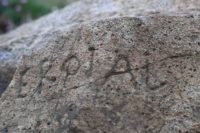 The village of Plougastel-Daoulas in Brittany is sending out an appeal to linguists, cryptographers, students, scholars and puzzlers of all stripes to decipher a mysterious inscription carved onto a boulder centuries ago, and they’re willing to put money on it.
The village of Plougastel-Daoulas in Brittany is sending out an appeal to linguists, cryptographers, students, scholars and puzzlers of all stripes to decipher a mysterious inscription carved onto a boulder centuries ago, and they’re willing to put money on it.
The inscription begins “grocar drear diozeevbio” and more text follows — “roc ar b,” “dre ar grio se eveloh ar viriones baoavel,” “r i obbiie:brisbvilar” — none of it in any recognized language.
“This inscription is a mystery and it is for this that we are launching the appeal,” said Veronique Martin, who is spearheading the search for a code-cracker.
The rock, which is around the size of a person, is accessed via a path from the hamlet of Illien ar Gwenn just to the north of Corbeau point.
The inscription fills the entirety of one of its sides and is mainly in capital letters but there are also pictures including a sailing boat. There are two dates, 1786 and 1787.
“These dates correspond more or less to the years that various artillery batteries that protected Brest and notably Corbeau Fort which is right next to it,” she said.
The rock is bathed by the sea. The image of the sailboat is so close to the foot of the rock that the waters touch it at high tide.
The only known part of the inscription is a relatively recent addition: the date 1920, engraved by a Russian soldier garrisoned there during World War I. Just in case there might be a link between this and the rest of the inscription, linguists in Russia were contacted but to no avail. It’s not a Cyrillic language/dialect and Russian does not appear to have anything to do with it.
 The Champollion Mystery of Plougastel-Daoulas, named after the French Egyptologist Jean-Francois Champollion who translated the hieroglyphic inscription on the Rosetta Stone, runs through the end of November 2019. All submissions, analyses and research reports, will be analyzed by a jury of academics and a representative from Brittany’s archaeology department. The most plausible entry will receive a €2,000 award.
The Champollion Mystery of Plougastel-Daoulas, named after the French Egyptologist Jean-Francois Champollion who translated the hieroglyphic inscription on the Rosetta Stone, runs through the end of November 2019. All submissions, analyses and research reports, will be analyzed by a jury of academics and a representative from Brittany’s archaeology department. The most plausible entry will receive a €2,000 award.
The municipality has already received more than a thousand emails. If you’d like to try your hand at solving this riddle, email veronique.martin@mairie-plougastel.fr .